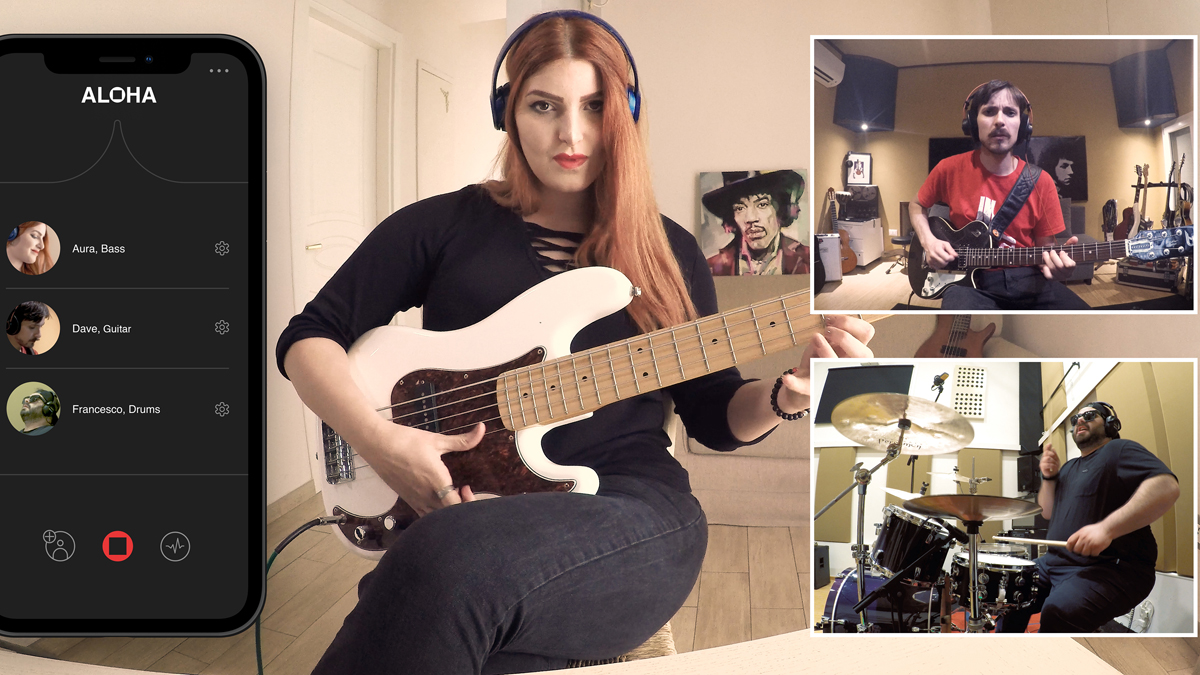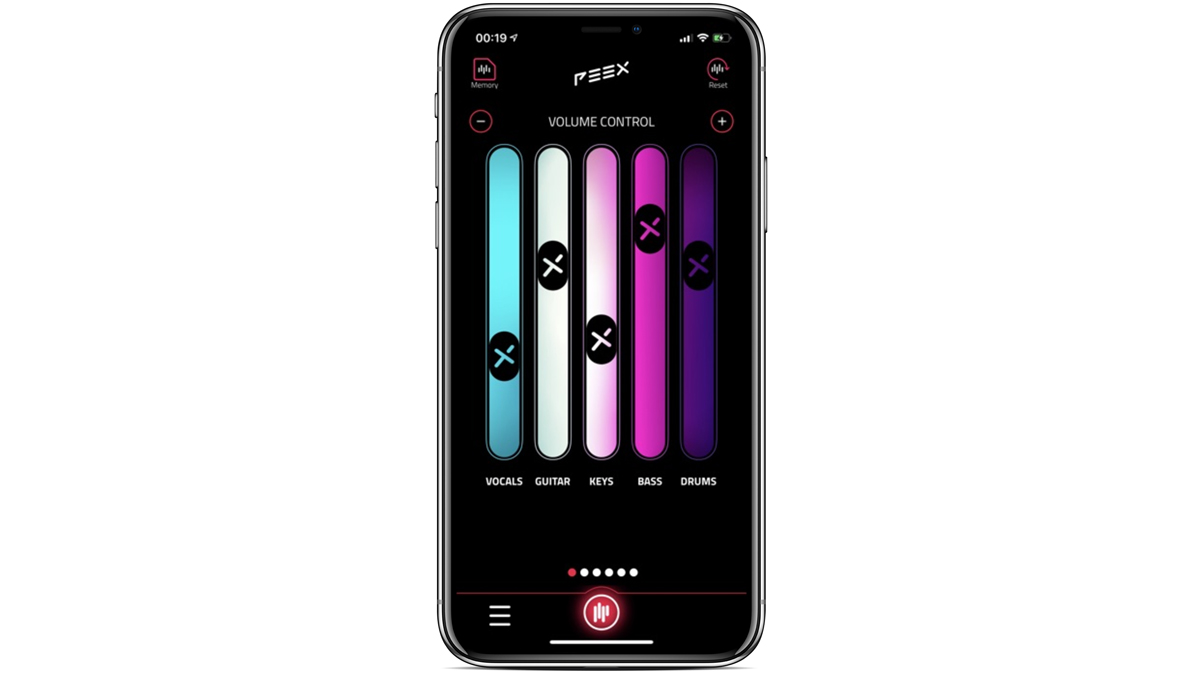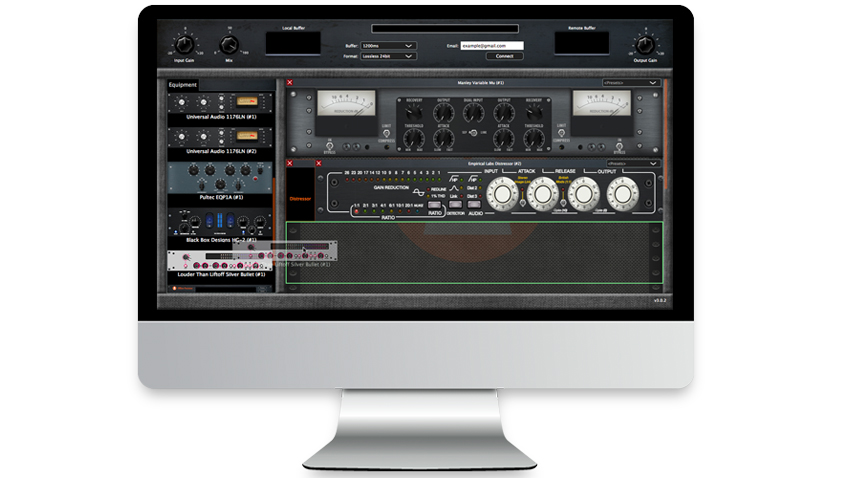5 reasons why 5G will be amazing for music lovers and producers
With 5G becoming available across the globe, let's have a look at what the new tech could mean for both music making and enjoyment…

5G is the next generation of mobile cellular technology. Before you ask, it is not just faster 4G (although it can be up to 20 times quicker). 5G brings with it lower latency figures and higher bandwidths - that is, more data and quicker - and it's more about what you can do with this extra girth that counts.
5G will mean some obvious improvements - like better sound quality for your streamed music and being able to play properly in time with other musicians online - but there are some other less obvious, yet far more exciting 5G musical possibilities.
From enjoying a virtual band on stage to accessing a recording studio on your phone, 5G will transform the way we make and enjoy music, and it might just save the live music industry as we know it.
So let's have a look at the big five advancements in music that 5G will bring…
1. An improved live experience
Should we ever get out to enjoy gigs any time soon, 5G could well change that experience beyond recognition, from buying a beer to enhancing the reality of the very gig itself.
5G will transform the way we make and enjoy music, and it might just save the live music industry as we know it.
The Chase Centre in San Francisco has already staged the first augmented 5G gig, where The Chainsmokers played on stage while fans added virtual digital enhancements by way of their 5G phones. They were able to “experience high-fidelity graphics and imagery timed with music,” and also enjoy other pre-, post- and in-show photo, video and interactive experiences via a special 5G app.
Before that has you running for the hills in fear of yet more mobile phones being present at live events, the O2 Arena in London offers a more practical vision of how 5G could impact the live experience, and it might even lead to less phone use.
Get the MusicRadar Newsletter
Want all the hottest music and gear news, reviews, deals, features and more, direct to your inbox? Sign up here.
The venue commissioned a report on 5G earlier this year and concluded that the new technology could revolutionise events there, including reducing the queuing at bars and merchandise stores - you pre-order your beers and try your T-Shirts virtually for size before you buy - and by providing multi-angled videos of the event.
These could be controlled live by fans or sent to every attendee after the concert, thus encouraging them to watch the gig rather than record it on their own devices. We can but dream…
2. An alternative live experience
As well as transforming music events, 5G could well end up being the live industry's saviour should coronavirus continue to impact the sector in the devastating fashion seen over the last few months.
Live streaming might well become the norm - at least in the mid-term - and 5G technology's improved wireless performance brings all sorts of additional features for the live performer wanting to beam their concert to the safety of your home.
Again, the entire gig could be filmed with multiple video streams so that the user experience could be completely customised. Want to focus on the lead singer rather than the rest of the band? Now you can!

Then there are other enhancements that could be added during a performance. Want to order some merchandise? Read each band's member's bio and about what they had for breakfast? Want to mix the drums quieter and make that guitar solo louder? All this and more could be coming to a sofa near you soon.
On a much bigger level, huge global events beamed to your home will be transformed. The first major gathering touted as a 5G showcase was to have been this year's Tokyo Olympics which have, of course, now been postponed to 2021. 5G will be at the core of many of the event's extra layers, from facial recognition security to self-driving cars, augmented reality arenas and result predictors.
If successful, these improvements will impact on other huge global music events. An interactive Glastonbury experience or slicker Eurovision might not be what diehard fans really want, but they're likely to get them, and huge global benefit gigs that make easy donations and rock star remote collaborations possible could all be made a reality with 5G.
And talking of collaborations, the real benefits of 5G are likely to come on a much more human level…
3. Playing together (in proper real-time)
The recent pandemic has, if nothing else, encouraged many musicians to collaborate with other people online. However, high latencies mean that 'real' real-time playing has so far been impossible, but with 5G being up to 20 times faster than 4G, the dreaded latency - the bounced time delay between players - is falling dramatically.
Music For All organised the world's first 5G music lesson featuring Jamie Cullum playing along 'live' in London with aspiring musicians in Bristol and Birmingham. It claimed: “We could make the delay between a note being played in London and that sound being heard in Bristol or Birmingham as low as 10 milliseconds, as if our performers were actually in the same room!” And as good as that was back in 2019, recent advances in 5G now mean that latency times can be reduced to the target of 3ms that most musicians are comfortable with.
As two of the biggest proponents of 5G, Elk Audio - check out Aloha, its new real-time online music collaboration platform - and Ericsson have been testing all sorts of musical applications of the technology and now claim to have attained latencies of just 1ms over a distance of 100 miles.
They have demonstrated how much impact this can make for musicians on every level, from online jams across Stockholm to full-on concerts in India, Thailand and across Europe, where musicians 'played together' from various different locations.
We're not talking global distances - the speed of light is a physical barrier that even 5G can't counter - but collaborations within hundreds of miles (as opposed to thousands) should soon be possible.
Those awkward out-of-time Zoom attempts at playing together with your bandmates during a pandemic should be a thing of the past then - hopefully both the situation and the latencies.
4. Better music production tools
“Now you can think of the possibility of a recording studio on your phone,” Ericsson's Bill Goodman said during the 5G panel at this year's NAMM show. “We think this is one of the game-changing capabilities that 5G will bring to the music industry.”
Where 4G had Uber, audio streaming, video and Google Maps, 5G too will bring killer apps. For the musician, these could be in the form of a proper collaborative DAW that works latency free. Or perhaps the big boys of DAW development will bring their professional features to the world of the browser-based DAW, where you can simply make music on any 5G device, at any time.
And what about that entire studio of gear, ready to download to your phone and play? Reach into it for any virtual guitar or plugin synth you wish, and play them in real time to add to your music or that made by your collaborator playing hundreds of miles away.

Or how about the use of some classic studio gear at any time you desire? Access Analog, for example, is already offering a studio of real vintage outboard gear for you to chain together and run your audio through. Now imagine that with much lower latencies and you can see how the studio industry could be transformed. Want to run your recordings through some classic boards at Abbey Road in real time? 5G could have the answer.
Legendary recording engineer Alan Parsons can also see more 5G benefits for other parts of the studio industry. “Do we really want to fly guys from London to my studio in Santa Barbara just because they are a great singer or guitar player?” he said at NAMM. “They’d much rather work in their own studio and it saves on air fares, jet lag, all kinds of things. There is a big future in recording at a distance and if 5G can deliver better quality audio and quicker and with better pictures to go with it, then the future is very exciting.”
5. And finally, the virtual reality gig
As we've seen, 5G might well transform a live gig for a fan or bring that gig to your home with glorious additions and detail. But how about being totally immersed in a gig without having to leave your house?
That's right, 5G could make the VR gig a possibility so you can experience a complete concert or festival - real, computer-generated or a combination of the two - without having to experience the (let's face it) major hassle of actually going there. We might be moving into the realms of sci-fi here, but being placed into the crowd at your favourite festival and enjoying the experience in virtual reality is now becoming, well, a reality.
Kunal Jathal of Verizon, a company very much at the cutting edge of VR and 5G, claims that such an experience is now possible thanks to 5G. “We are able to create a VR experience where it was essentially a large symphony orchestra with 100 sound sources and you are able to walk around this space and hear each instrument being produced. It is entirely convincing.”
Concerts could be created digitally or be augmented 'real' events with players joining in from remote locations, or they could be entirely 'real' concerts with you the viewer placed in any location you wish.
It's a future with endless possibilities, but at a time when many of us have been forced into staying at home, it's great to see that technology might well be evolving to let us experience events in new ways and to experience completely new realities in music making and consumption.


Andy has been writing about music production and technology for 30 years having started out on Music Technology magazine back in 1992. He has edited the magazines Future Music, Keyboard Review, MusicTech and Computer Music, which he helped launch back in 1998. He owns way too many synthesizers.
“I’m looking forward to breaking it in on stage”: Mustard will be headlining at Coachella tonight with a very exclusive Native Instruments Maschine MK3, and there’s custom yellow Kontrol S49 MIDI keyboard, too
“Turns out they weigh more than I thought... #tornthisway”: Mark Ronson injures himself trying to move a stage monitor










